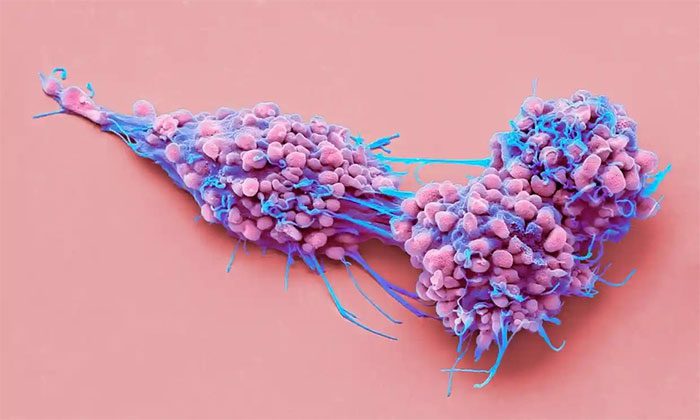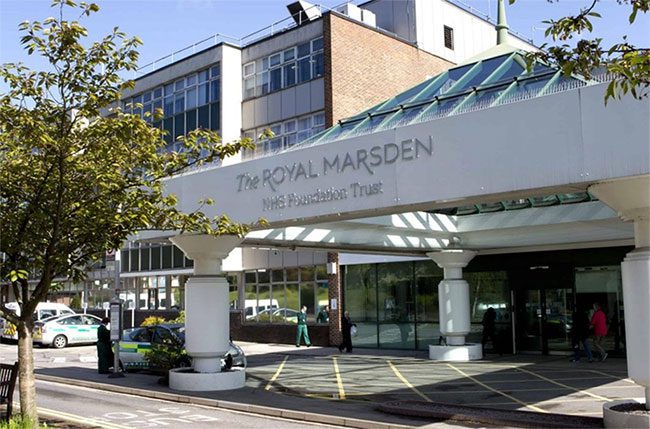A revolutionary treatment method has been proven to significantly shrink tumors in nearly half of the patients suffering from the disease.
The new therapy uses a combination of multiple drugs that inhibit the growth of cancer tumors and help prevent the disease for many years, according to The Guardian.
Experts state that the results from clinical trials are “remarkable” and “very exciting.” The research was presented at the world’s largest cancer conference held from June 2-6 in Chicago.
The results demonstrate that the new therapy is far more effective than any other treatment method.

Ovarian cancer cells displayed under a microscope. (Photo: Science Photo Library).
Potential Therapy
One patient reported that doctors had warned her that they could do nothing more as her ovarian cancer was resistant to both chemotherapy and hormone therapy.
However, the new therapy helped her defeat the disease for the second time. The tumors completely disappeared, while the latest test results showed no signs of the disease.
The phase two clinical trial was led by the Royal Marsden NHS Foundation Trust and the Institute of Cancer Research, UK. The drug avutometinib was tested both alone and in combination with defactinib in 29 patients.
The trial results showed that 45% of patients using the new combination therapy saw their tumors significantly shrinking. This demonstrated nearly double the effectiveness compared to the second-best treatment method using trametinib, which had an effectiveness rate of 26%.
Results were even better in patients with specific mutations. About 60% of those with ovarian tumors due to KRAS gene mutations saw their tumors shrink after treatment. Even 29% of patients without mutations also responded to the new therapy, marking an improvement over standard treatments.

Royal Marsden NHS Foundation Trust Cancer Research and Treatment Center. (Photo: Royal Marsden).
All patients participating in the trial had low-grade serous ovarian cancer, a disease that tends to affect younger women.
Dr. Susana Banerjee, a researcher involved in the study presented at the annual meeting of the American Society of Clinical Oncology, stated that the new therapy could represent a significant breakthrough.
“These initial results could be great news for women with low-grade serous ovarian cancer, indicating a much more effective option than current treatments,” she said.
Dr. Banerjee is a consultant medical oncologist at Royal Marsden and leads the women’s cancer group at the Institute of Cancer Research, UK.
“It is wonderful to see so many patients responding positively to this innovative therapy. I am grateful to those who participated in the trial, making this research feasible,” she added.
Positive Signals for Women
Avutometinib is a dual RAF and MEK inhibitor that targets certain proteins that help cancer cells grow and survive. Studies indicate that the drug may lose its effectiveness over time as tumors develop resistance.
However, when combined with defactinib—a drug that counteracts a type of protein that promotes drug resistance—avutometinib works more effectively. The combination is over four times more effective than using avutometinib alone.
Dr. Kathleen Moore from the Stephenson Cancer Center in Oklahoma, a co-author of the study, described the results of the new treatment as “very exciting.”
“The beauty of this combination is that you are overcoming two forms of resistance in the tumors. The response results of the new therapy are better than any other drug. This is a field that deserves more attention,” she stated.
The new study does not yet have data on how long the disease is suppressed, but previous studies show that patients treated with combination therapy have 23 months before the cancer progresses again.
Dr. Banerjee hopes that the results from the new therapy study could become the standard of care for women.
Ms. Christine Cull, 71, was initially diagnosed with low-grade serous ovarian cancer in 2009. She was horrified to discover the disease had returned in 2014.

Christine Cull and her husband Dave happy after ovarian cancer treatment with the new therapy. (Photo: Guardian).
She underwent chemotherapy, hormone therapy, and several surgeries, but none were effective.
“My most desperate moment was in 2019 when doctors said they could do nothing more. That was terrifying. My cancer was completely unresponsive to chemotherapy and hormones. The doctors also could not perform any more surgeries,” she recounted.
Doctors referred her to the Royal Marsden cancer specialist center, which had the expertise to perform another surgery. When the disease began to recur in 2020, Ms. Cull participated in the new therapy trial.
“I have scans every three months and see the tumor getting smaller. When I discovered the tumor had disappeared on the scan, I felt relieved, surprised, and very happy to be able to share this good news with my family and friends,” she recalled.
“Thanks to this trial, I can live a peaceful life with my husband, three children, and three grandchildren, with hardly any side effects.”


















































